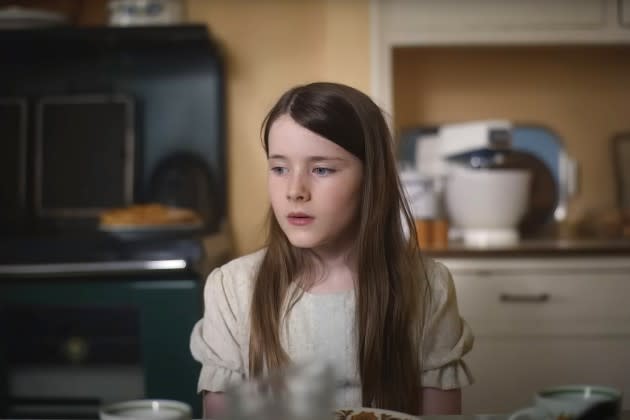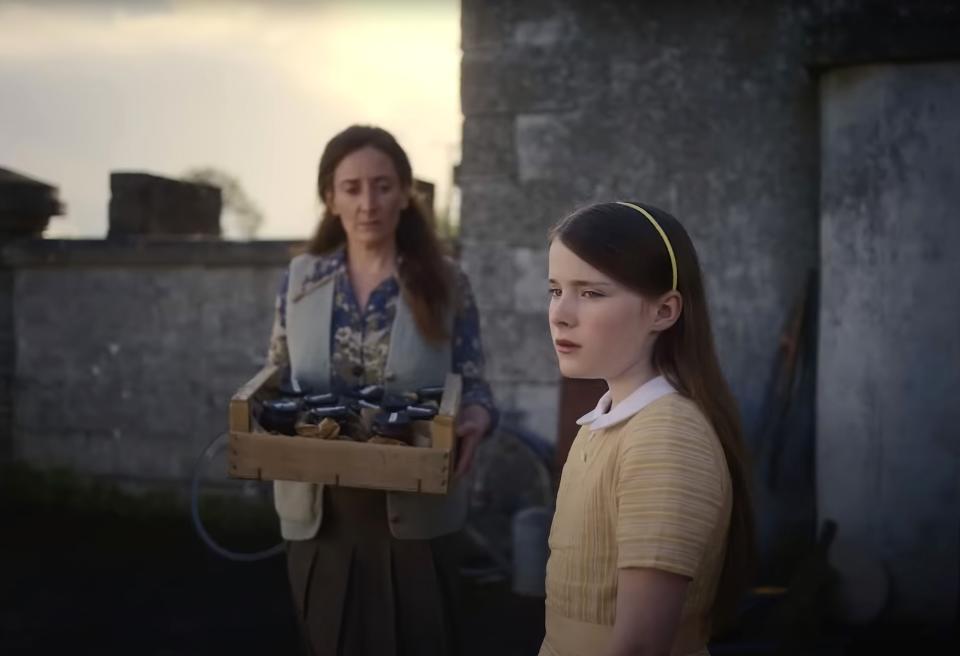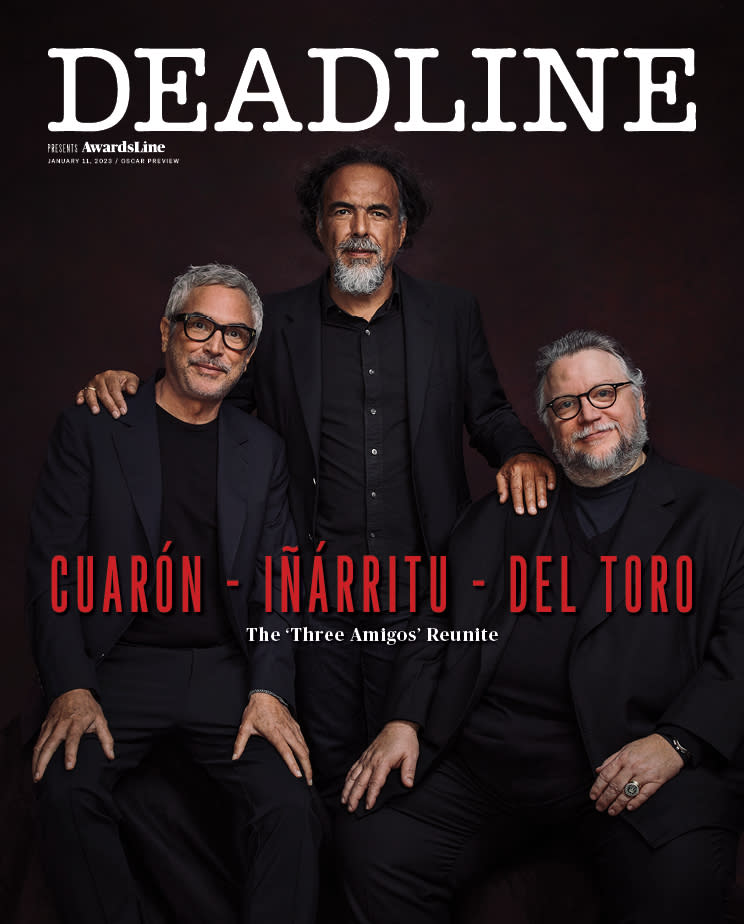International Feature Focus: Why Irish Film ‘The Quiet Girl’ Is Making Noise In The Oscar Race

For the last three years, the winner of the International Oscar has pretty much been a given: First came Bong Joon-ho’s Parasite, then Thomas Vinterberg’s Another Round, and then Ryusuke Hamaguchi’s Drive My Car — all anointed by Cannes and eased to the finish line after prominent festival play in the usual cosmopolitan areas.
This year’s shortlist, however, paints 2022 as being far from such a one-horse race. True, the supremacy of Cannes as the foreign-language kingmaker is unchallenged, having berthed nine of the 15 contenders, and it’s worth wondering whether Triangle of Sadness would be the film to beat had its director, Sweden’s Ruben Östlund, filmed it in his native tongue. And, yes, once again, the field is overwhelmingly male, with just three female-directed titles — Morocco’s The Blue Caftan, France’s Saint Omer and Austria’s Corsage — vying with heavyweights like Park Chan-wook (South Korea) and Alejandro G. Iñárritu (Mexico) for inclusion in the final five.
More from Deadline
Oscars: Academy Unveils List Of 300-Plus Films Eligible For Best Picture
As The Political Dust Settles, Let's Take A Minute To Fret About The Movies
2022-23 Awards Season Calendar - Dates For The Oscars, Golden Globes, Guilds & More
However, the anomaly in this year’s shortlist is a film that challenges the usual notions of representation in the category. Based on the novella Foster by Claire Keegan, Ireland’s entry The Quiet Girl tells the story of Cáit, a 9-year-old girl who is sent away by her dysfunctional family to live with relatives in the country during the summer of 1981. One of a handful of films made by largely English-speaking countries to be submitted to the Academy (another being Australia’s You Won’t Be Alone, filmed in Macedonian), The Quiet Girl is filmed entirely in the Irish language, a form of Gaelic, which poses some interesting questions about cinema and national identity.

For director Colm Bairéad, making the shortlist was an achievement in itself. “We knew from the outset that we would be eligible,” he says, “but we also knew that the task of competing at that level — against the very best of world cinema — was an extraordinarily difficult one. So I kind of pushed that notion to the back of my mind and just focused on making a film that would appeal to my own sensibility.”
But after the film’s critical reception proved so positive (more on that later), the prospect of getting a nomination in the Best International Feature category quickly became a talking point. Says Bairéad, “No Irish film has ever been nominated in this category at the Academy awards. For an Irish-language film to achieve this would be a monumental moment, both for our country and for our language, which is an endangered language and which has rarely had a voice in the history of cinema.”
Of all the films on the list, Bairéad’s film has had the longest life, premiering in February at the Berlinale’s often-overlooked Generations strand, opening the Dublin International Film Festival just a week or so later, and getting a dual release in the U.K. and Ireland the following May. But the film is still on its path, garnering more and more enthusiastic reviews as audiences continue to discover it.
Was it obvious to Bairéad that his creation would be so enduring? “Well,” he says, “there’s always that moment in the edit when your film — though incomplete — finds its voice for the first time, where you stop looking at the sheet music, so to speak, and just let this thing you’ve assembled speak to you for what it is. I remember at the end of a particular viewing being overwhelmed, emotionally. It’s that magical and slightly dangerous moment where you fall in love with the work. And from that point onwards, you give all of yourself to it and you’re trying to help it to find its fullest expression of itself, in the hope of achieving a similar response in others.”
In terms of the audience reaction, Bairéad credits the film’s success in Berlin and at the Irish Film and Television Awards (AKA the IFTAs), where it picked up seven awards, including Best Film, with creating momentum before the theatrical release.
“It just kept growing and growing,” he recalls, “holding screens across the two territories. In the end, The Quiet Girl ran in cinemas for over six months and grossed over €1 million at the Irish/U.K. box office, smashing the previous record for an Irish-language film and becoming a kind of cultural landmark here in Ireland. Beyond its home shores, it has so far been released in Australia and New Zealand, where it received a phenomenal reception, and it’s still playing in Australian cinemas after nearly four months. Audience reactions at festivals across the globe have been just as encouraging with the film receiving many Audience Awards, so we’re very excited to see what 2023 brings when the film is released in more international territories, including the U.S. [in February].”
The film’s commercial success might even mean that The Quiet Girl has a long shot at appearing in other categories, something that would have been unthinkable five or more years ago. Says Bairéad, “The success of international films in multiple categories of the Academy Awards in recent years is a good indicator of how the Academy is opening its arms to a broader, more inclusive idea of cinema. Which is, in itself, reflective of a broader audience response, I think.”
He recalls Bong Joon-ho’s Oscar acceptance speech, in which the Parasite director joked about “the one-inch-tall barrier of subtitles”. “People are happily stepping over that now,” he says. “You can feel the energy of that audience online, the fervency with which they engage with this cinema from all over the world; it’s palpable. As for Irish-language film production, it will be really interesting to see what emerges in the coming years in the wake of The Quiet Girl’s success. No one can claim anymore that making a film in Irish is a dead end, either critically or commercially. That veil has been lifted.”

The film’s epic journey has given Bairéad a lot of time to reflect about his film’s meaning and how to interpret its burgeoning popularity.

“You could say that The Quiet Girl is a small story, that it’s a kind of miniature, and that would be true,” he says. “But, to me, its essence has always felt huge, because it touches upon things that are fundamental to all human beings — the need for love, the question of family, the phenomenon of grief. These things were all present in the story the film was adapted from, which itself had been translated into multiple languages, so it was clear before we began that there was a universality to this story. It was just a question of harnessing that and honoring it in a new medium.”
Looking at the shortlist, The Quiet Girl stands out, alongside Belgium’s Close and India’s Last Film Show, as part of a mini-wave of films this year that treated the inner lives of pre-teen children with care and respect. Might that have something to do with its success? Says Bairéad, “There’s possibly some truth to the idea that films centered on children have the potential for a broader acceptance — it’s difficult for an audience not to care for a child, regardless of what culture that child is coming from or what language they’re speaking. From our own direct experience, audiences everywhere have tended to speak of the film’s beauty, referring not only to the visual presentation of the story or the manner of its telling, but to its deeper meaning.”
Which is?
“‘What will survive of us is love,’ wrote the great poet Philip Larkin. That same message applies to this film.”
Best of Deadline
2022-23 Awards Season Calendar - Dates For The Oscars, Grammys, Guilds & More
TV Cancellations Photo Gallery: Series Ending In 2023 & Beyond
Hollywood & Media Deaths In 2023: Photo Gallery & Obituaries
Sign up for Deadline's Newsletter. For the latest news, follow us on Facebook, Twitter, and Instagram.

 Yahoo News
Yahoo News 
